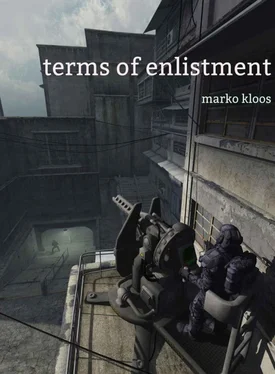There are four other recruits at our table, all engaged in trying to figure out how much food they can squeeze into their mouths without dislocating their jaws. Our table has gender parity—three guys, three girls—and when I look around at the other tables, it seems that the same gender ratio is reflected throughout the platoons.
“That’s real meat,” someone else at the table says, a tall girl with short, dark hair. “It’s got texture and everything. I haven’t had a real piece of meat since I moved out of my parents’ place.”
“Beef,” her seat neighbor says, pointing at it with a fork. “That’s a hundred-dollar piece of beef right there.”
The girl slices off a healthy chunk of her beef, and stuffs it into her mouth.
“There goes ten dollars,” she says around the mouthful of food.
I’m sure they’ll make us sweat for every bite later on, but right now I am resolved to enjoy my meal, and stuff as many calories into myself as possible without throwing up. The food alone made the signing up worth the effort, and if all the meals in the military are like this, I’ll cheerfully jump through whatever hoops they put up.
After lunch, Sergeant Gau walks us over to a warehouse full of military clothes and gear. The equipment issue works much like the chow line. We file past the issuing stations in a single column.
At the first station, the surly-looking attendant pulls a large rucksack and an even larger duffel bag from a stack and tosses them both onto the counter in front of me. There are scuff marks on the heavy canvas, the olive drab color is faded in spots, and I can see the rectangular line of pulled-up stitching where the previous owner’s name tag was removed from the outer flap of the rucksack.
The rest of the gear is used as well, ranging in condition from merely scuffed to nearly unserviceable. At one of the stations, they hand me a folding shovel and a utility knife. The blade of the knife shows the marks of hundreds of sharpenings. The folding shovel used to have a blade coated in olive drab paint, but most of the paint has come off, and the edges of the shovel blade are nicked. It seems like they’re issuing us mostly stuff that’s good enough for one more issue cycle before being scrapped.
They measure us for our uniforms, and then give each of us several sets of fatigues. Those are used, as well, but I am happy to see that at least the underwear and socks seem to be brand new. I guess there are limits even to government frugality.
“Those are yours to keep,” Sergeant Gau says when he sees me inspecting the new pairs of knee-high gray socks, checking them off on my “Received Equipment” list, and stowing them in my duffel bag.
“When you wash out, you get to take your socks and underwear with you. Nobody would want to wear them after you, anyway. Consider those a souvenir of your short life in the military.”
We spend the afternoon filling our rucksacks and duffel bags: uniforms, rain gear, equipment pouches, helmets, combat boots, chemical warfare protection kits, running shoes, shower sandals, sewing kits, and a bunch of other articles of unknown purpose. When we have finally cleared the last station, it’s late in the afternoon, and we are each weighed down with a rucksack and a bag that probably weigh a hundred pounds together. Some of the smaller members of our platoon are swaying under the load as we assemble again in front of the building. Marching us to our quarters with a hundred pounds of gear seems the perfect opportunity for a conditioning exercise, but Sergeant Gau has a bus waiting for us.
We are quartered in a large, flat-roofed building that stands in a long row of identical buildings. The only way to tell them apart is to look at the signs over each entrance, where a large screen lists the numbers of the platoons housed within. We share our building with five other platoons. The central staircase splits the building in half; each floor has a large room to each side of the staircase. When Sergeant Gau leads us into our platoon bay, we see two rows of bunk beds, one on each side of the room. There are two lockers in front of each bunk bed, facing out into the center aisle.
“There are name tags on your bunks,” Sergeant Gau says as we file into the squad bay. “You will find your bunk, and place your equipment bags on top of the mattress. Execute .”
There’s a bit of disorder as forty recruits fan out to find their respective bunks, but we find that the order is alphabetical. There is a small stack of sheets, a blanket, and a pillow at the head of each bunk.
My bunkmate turns out to be the dark-haired girl from our lunch table. We give each other encouraging smiles as we haul our gear onto our beds. She has the top bunk, purely by alphabetic proximity—she’s HALLEY D, I’m GRAYSON A.
We spend another hour unpacking our gear and putting everything into our lockers according to Sergeant Gau’s direction. He stands in the middle of the squad bay, with one recruit’s bags emptied on the floor in front of him. He holds up one item at a time, calls out its designation, and waits for us to find the same item in our own piles of stuff. When he is satisfied that we’re all holding up the same thing, he tells us where to place it into our lockers.
When all our gear is stowed, Sergeant Gau has us open our lockers again and take out our issue sweatsuits and running shoes. We change into the suits, and for the first time, the platoon looks uniform in appearance.
“Take your civilian clothes and stow them away in the bottom drawer on the right side of your locker. Most of you will need them again soon.”
When all our equipment is stowed in our lockers, Sergeant Gau leads us to the chow hall. Dinner is no less overwhelming than lunch, and we eat ourselves into a stupor once more: grilled cheese sandwiches, beef stew, three different kinds of fruit.
After dinner, we’re back in our quarters, where we find personal data pads on our bunks. Each of them has a label above the top of the screen, bearing the last name of its new owner. The PDPs are of a kind I’ve never seen. They’re large and clunky, with monochrome screens that look like a throwback to a bygone century. They have translucent polymer covers that fold over the screen for field use, and the whole thing is perfectly sized for the side pocket of the fatigues they issued us earlier today.
“Not exactly the latest technology,” my bunk mate muses in a low voice as she inspects her own data pad. “I’ve had better stuff in elementary school.”
“Those are your new companions,” Sergeant Gau says from the center aisle of the platoon bay. “They may not look like much, but they’re tough and reliable. Familiarize yourselves with your PDPs, and call up lesson 1.001, titled ‘Enlisted and Officer Ranks.’”
We sit in two rows along the center aisle, calling up the lesson as directed, and Sergeant Gau has us repeat the rank structure of the Armed Forces from top to bottom. When we have prayed the litany a few dozen times, Sergeant Gau has us turn off our PDPs and repeat the process from memory another few dozen times. When he is satisfied that we have the rank structure memorized, he makes us stow our PDPs.
“Now,” he says. “Let’s see which one of you people actually listened to me earlier today. Assemble in front of the building, in three rows. Execute .”
We look at each other with budding dread. We’ve all stuffed ourselves at both lunch and dinner—more so at dinner, since we didn’t have to exercise all day—and my stomach is still uncomfortably full. Just the thought of running or doing push-ups is making me nauseous.
“That means now , people,” Sergeant Gau shouts, and we all rush to file out of the platoon bay.
When we’re all assembled in three untidy rows, Sergeant Gau leads us down the road. We start out walking, but after a few steps, Sergeant Gau falls into a trot.
Читать дальше












